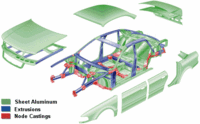Study Proves Increasing use of Aluminium in new European Cars, Saving Weight, Reducing Fuel Consumption and Cutting CO2 Emissions
BRUSSELS, January 15 -- A new study shows the amount of aluminium used in new European cars has risen from 50kg in 1990 to 132kg in 2005 and is predicted to grow by another 25kg by 2010. In 2005 two million tonnes of aluminium components were put on European roads in new passenger cars. The achieved weight savings will lead to an annual fuel saving of 1 billion litres and will save roughly 40 million tonnes of CO2 emissions over the lifespan of the vehicles.
The study by Knibb, Gormezano & Partners (KGP) in cooperation with the European Aluminium Association (EAA) includes data from automotive companies and suppliers, EAA member companies and past data from KGP. The study is based on the analysis of the 15 million cars produced in Europe in 2005 and investigates 20 body components, 17 chassis and suspension components and 25 powertrain components.
The study focuses on different aluminium semi-materials - castings, extrusions, forgings and sheets. In the car body the largest quantity of components made from aluminium are air conditioning systems, bonnets, bumper beams and steering columns. Aluminium parts in the chassis and suspension section of the cars are mainly wheels, suspension arms and steering components. Cylinder heads, cylinder blocks, engine covers, pumps and radiators represent the majority of aluminium components in the drivetrain of new cars. Today, a growing amount of aluminium is being used in particular in closures, body structure and chassis applications, improving also automotive safety and performance.
Roland Harings, Chairman of the EAA Automotive Board said "Europe is leading the way in innovative use of aluminium in cars. As 100 kg of aluminium on a car can reduce CO2 emissions per kilometre by 9 grams, and even 10 grams if fuel production is considered, aluminium as material for lightweighting cars has a clear advantage. With the continual introduction of new technologies delivering further advantages in the design and manufacturing processes the trend to increase the amount of aluminium per car will continue. Aluminium will certainly play an important role in future generations of sustainable cars".
Aluminium is all around us. It is light and strong, corrosion resistant and durable, formable and highly conductive, it has natural shine and is recyclable. Aluminium provides intelligent solutions for present and future generations.
The European Aluminium Association, founded in 1981, represents the European aluminium industry from alumina and primary production to semi-finished and end-use products, through to recycling. The European aluminium industry directly employs about 236,000 people.
Notes to Editors: calculations are based on the following assumptions:
- Car lifespan of 200,000km
- Yearly distance per car: 15,000km
- 0.35 litres of fuel saved per 100km per 100kg weight reduction
- 1 kg of aluminium provides 1 kg of lightweighting
- 2.835 kg of CO2 per litre of fuel, as mean value for petrol and diesel, including pre-combustion (i.e.CO2 generation for fuel production)
- 2.455 kg of CO2 per litre of fuel, as mean value for petrol and diesel, excluding pre-combustion
For further information please contact: Stephen Weller: +32-2-775-63-45 email: weller@eaa.be, Bernard Gilmont: +32-2-775-63-40 email: gilmont@eaa.be



